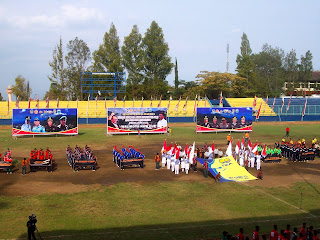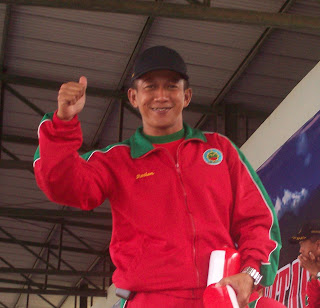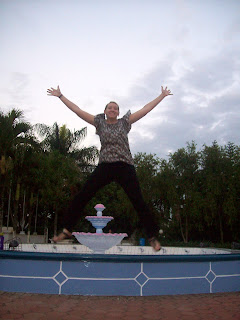If there is anything that I have learned
from the Peace Corps over the last year and a half (this includes the time I
waited to see if I was accepted to serve), it is patience.
I had to be patient for months before I
knew if I had, as we all said in preparing to graduate from Carleton, "a
future!!" When I finally knew that I had "a future!" after
Carleton, I still didn't know what country I'd be going to, or when I'd be
going. Admittedly, I hoped the Peace Corps would change their minds about East
Asia and tell me I was going to West Africa.
But my part in Tikkun Olam was destined to be elsewhere, Indonesia. Leading up to
my departure, I had a heavy heart, worried about learning a new language,
learning who Indonesians were and how they were different (and the same) as
me...
Now I am here and my patience paid off!
That makes it sound like I had a choice in being patient or not and I chose to
be patient. Let's be honest, I didn't have a choice, or as I like to say here,
"Tidak ada pilihan" (there aren't
choices!) So while I was patient not
by choice but out of necessity in waiting to come here, now is the time that I
can really hone my patience skills, and believe me, people, I have!!
Here are some examples of trying to be
patient in Indonesia...read: I really wanted to scream during these situations
(or maybe cry...there is a whole spectrum of emotions here!), but I'm the only
American many people will meet here, so I need to act normal. Aka I can't tear
at my hair and jump on a chair and act like a wild animal and scare people
away. That will just confirm that Americans are strange.
All this being said, I've only been here
for 3 months...imagine how patient I'll be in 2 more years...
Anyways, example #1 of my patience
tested...
"Mister,
mister, photo, photo!"
If there is one thing virtually every
Indonesian has, it is a camera phone to take pictures with your local bule (foreigner). This translates to
sweet, innocent children (from elementary school to high school) in a school classroom
turning into photo-hungry monsters as soon as the lesson or program is over.
As if taking pictures when you are sweaty
and annoyed isn't bad enough, I don't understand why some students are so pushy
about it. Like physically pushy. Some people cram into the photo and shove me
and I literally almost fall over. Half of the photos that they take are
probably of me falling over, or gritting my teeth and trying to stand my ground
while they push me over so they can get into the picture...
Photo-taking is a time commitment here. The
time commitment exists because every last person wants a photo with you and
herself individually. It doesn't matter how many times I politely say, "Satu lagi saja, sama semua" (only
one more, with everyone), the individual photos of me and one student continue.
Eventually, after usually about 5-10 minutes, I have to calmly walk away before
I start pushing people over, too.
The worst part of this picture-taking is
not the fact that it takes time, or that I'm sweaty and red, or that I'm ten
feet taller than everyone in the picture, or that I'm being pushed over. It is
the flood of emotions that comes during and after taking the pictures.
For someone who, Alhamdulillah (thanks be to God), has
not really ever felt objectified as a woman, one day of photo-taking in
Indonesia leaves me wanting to cry at my objectification.
Now while I think I can safely assume that
the young people who want to take a picture with me are not trying to objectify
me, knowing this does not mean I have to stop my natural reactions to a
situation. And man, do I feel objectified. Even more so when I'm almost shoved
out of the picture because of people pushing me. This makes me feel that the
goal is not to get a picture with a friend and English teacher, but to get a
photo with the white lady to show one's friends later. The request for a photo
does not come after knowing me for a week and spending time getting to know me,
it comes after seeing me for one minute and simply wanting a photo with a white
person. I become an object to show off rather than a friend or a person.
I realize that my point of view is skewed
because I am only expressing my opinion rather than allowing students to share
their side of the story, too, but everyone needs a moment to vent, so this is
my moment. That being said, it is not everyone who objectifies me and shoves me
over in a photo. Adults are usually very polite. University students are
educated about respecting the person with whom you want to take a picture. Boys
take one or two photos all together. Some girls shyly ask if they may take a
photo, and bonus, they may ask in English! But the general horde of teenage
girls in the school setting is pushy and objectifying and it drives me up the
wall.
I almost lost it one night at a small
festival when I was talking to a principal. His students gathered around while
we were talking and started taking pictures. Okay, that's life. But one girl's
stupid camera phone had a flash on it, and she extended her arm over everyone
else to get closer to my face, and pressed that flash button right in my face.
Let's just say that that flash could have been the light at the end of
someone's tunnel...
"There
is still work to be done here:" Skin Color in Indonesia
 |
| Indonesias have beautiful complexions! I only wish they could see this, too. These are 2 girls from my school. |
 |
| My host nephew (L) and brother (R), chilling in the living room. |
It is simply a fact of life here that I am
beautiful since I have white skin. I finally worked up the courage to ask someone
who was constantly calling me beautiful if she called Indonesians beautiful,
too, or just me. She said she calls everyone beautiful, not just me, but I have
yet to hear her call an Indonesian beautiful...
I have taken this opportunity of being
called beautiful all the time to turn the tables on the complimenting person
and tell her she is beautiful, too. And then when someone pats my arm and says,
"kulit putih, cantik,"
(white skin, beautiful), I launch into my explanation of how many white people
in the US like to be tan because tanner skin is considered more beautiful in
the US. Tanner, like an Indonesian's skin. I think the general reaction has
been either disbelief that this could be true, or blatant disagreement that
that it is stupid to think that tanner is better.
Patience.
I'm not sure if this next anecdote should
be under the heading of patience or
under a heading about breaking my heart.
But this is truly what someone said to me...
"Sebelum
kamu pergi ke sini, Sarah, aku takut bahwa kamu akan punya kulit hitam, seperti
orang dari Africa. Dan aku takut orang yang punya kulit hitam. Mereka bukan
orang baik."
(Before you came here, Sarah, I was scared
that you would have black skin, like an African person. And I'm scared of
people with black skin. They are not good people.)
Well good God, what do you say to that?
I took a deep breath and asked her why she
thought that. She said she just did. I asked if she'd met a person with black
skin. Nope. So I resorted to a simple explanation about how people with black
skin are just like us. They are nice, they work hard, they are smart. Simply having
black skin doesn't make someone a bad person.
I also was honest and told her that it was
hard for me to hear her say that because I did not feel the same way and that
her belief that black people are bad made me sad. In my broken Indonesian, I went
right into a explanation on the source of a lot of racial problems (or at least
what I believe to be a major source of many racial issues), colonization. I explained
about how in Indonesia, the Dutch came and tried to convince Indonesians that
white people are better. The same thing happened in many parts of Africa, too. At
the present time, it is really frustrating for me to meet Indonesians who
desire white skin because it is more beautiful. I think that belief is a result
of oppressive colonization and continued stereotypes. I'm not sure how much of
that appropriately translated, but she definitely understood that I disagreed
with her and wanted her to learn more about race.
Patience. I have two years to help people
unlearn that white is beautiful and brown is bad.
































